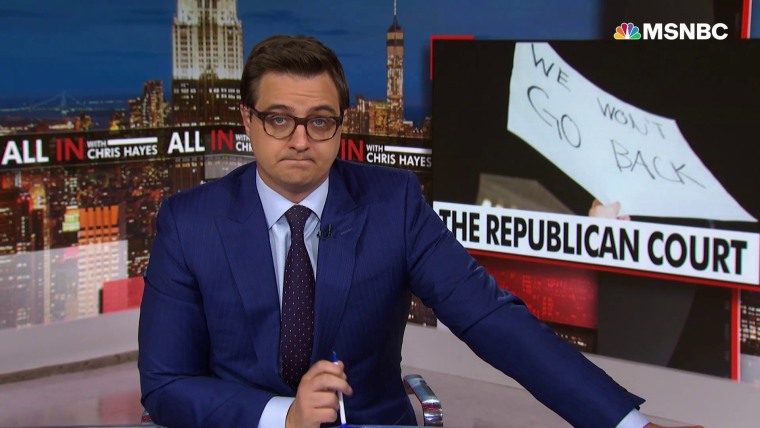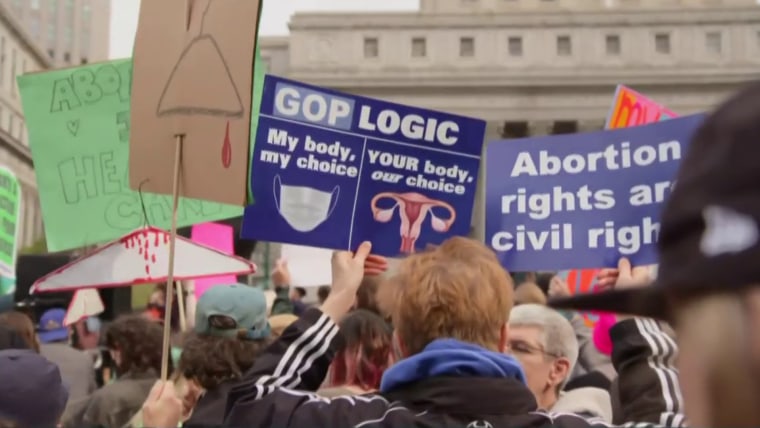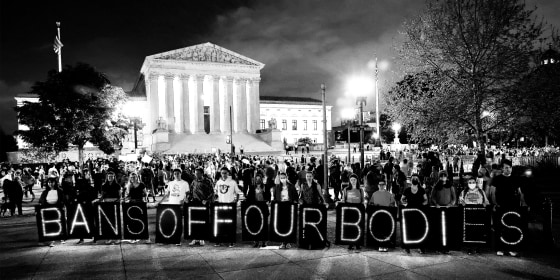The nine justices of the U.S. Supreme Court like to portray themselves as wise men and women on the mount, dispassionately dispensing wisdom. But the Supreme Court is nothing special. To know the politics is to know the institution and what it will do.
Hopefully Monday night’s leak of a draft of an upcoming court decision that would throw out the landmark 1973 Roe v. Wade abortion-rights ruling strips Americans of their rose-colored glasses and shows the court as a predictable third political branch of the U.S. government just like the White House and Congress.
The Supreme Court is nothing special. To know the politics is to know the institution and what it will do.
In the draft opinion for Dobbs v. Jackson Women’s Health Organization, a case challenging Mississippi’s ban on abortions after 15 weeks of pregnancy, Justice Samuel Alito wrote that there is no constitutional right to abortion.
“We hold that Roe and Casey must be overruled,” he wrote, referring to 1992’s Planned Parenthood v. Casey, which affirmed Roe’s finding of a constitutional right to abortion services but allowed states to pass some restrictions. “It is time to heed the Constitution and return the issue of abortion to the people’s elected representatives.”
For some reason, the nation gasped when Politico published the leaked draft, but, come on: Who didn’t know that this case would end this way?
Do Americans think the Supreme Court justices were behind closed doors actually trying to decide this case? Did they have an image of justices poring over thick law books, batting ideas back and forth, perhaps debating one another before making a decision?
Please. The court made its decision long ago.

Justices vote on cases almost immediately after oral arguments. The same week they hear arguments, they close themselves in a room and, one after the other, explain how they would vote. No one else is allowed in that room, so only the nine know the details of that first immediate vote. But that vote is usually the binding decision. Justices don’t take time to deeply research anything the lawyers argued to them in court. It’s almost as if the arguments don’t matter.
This means that, in all likelihood, the Supreme Court decided Dobbs the week of Dec. 1, and the justices have known the result since last year.
You’re going to hear a lot of people say of Monday night’s leak, “It’s only a draft! Things could change! Anything could happen!” Sigh. Yes, there is a wild possibility that a justice could change his or her mind. Several insider books on the Supreme Court make this possibility clear. Those same books also make clear how rare that is.
The wording of the opinion may change, but the conclusion that Roe v. Wade is no longer binding will not.
That means while the wording of the opinion may change, and likely will change if only because it’s been made public, the conclusion that Roe v. Wade is no longer binding will not.
So if the decision was made months ago, what has the Supreme Court been doing since December? Justifying their votes for the public and for history.
A justice on the winning side, usually chosen by seniority, goes to their clerks and drafts an opinion explaining why their side won. That draft — which is what Politico has, the court has confirmed — is sent to the other justices. Those who disagree write a dissent. Those who like the decision sign on, and those who like the decision but would have phrased it differently or want changes to win their vote on the opinion begin negotiating with the author and their supporters for modifications. Or they write their own concurring opinion.
That’s where the court is now.

Regarding the point about seniority, if Alito is crafting the majority opinion, then that likely means conservatives senior to him — Chief Justice John Roberts and Justice Clarence Thomas — aren’t completely with him. Roberts likely wants a less draconian decision, and Thomas likely wants a more draconian decision. Look for Thomas to vote with the winning conservative side but write an opinion that will be even harsher than Alito’s. I think Thomas will argue that this decision means other Supreme Court decisions that found rights not specifically written in the Constitution are also invalid and that if it isn't spelled out in the Constitution, it isn't a right.
The politics of the Supreme Court and the politics surrounding the Supreme Court have meant this day has been coming for years. In modern times, Republican presidents nominated justices who were going to overturn Roe one way or the other, the rule of law and precedent be damned, and Democratic presidents nominated justices who were going to find some way to keep Roe on the books, the rule of law and precedent be damned.
On this one issue, abortion, the justices’ vote could already be counted when they made it through the Senate. Sugarcoat it, talk around it, pretend like it didn’t exist, but abortion was the undercurrent of all of the fights over the Supreme Court in the White House and the Senate for the last 20 years or so, and Republicans won that fight in 2016 when Sen. Mitch McConnell, R-Ky., denied former President Barack Obama’s nominee Merrick Garland a confirmation hearing after Justice Antonin Scalia died.
Look for Thomas to write an opinion that will be even harsher than Alito’s.
McConnell held Scalia’s seat open until after Republican Donald Trump won the presidency and replaced Scalia with another conservative: Neil Gorsuch. The win was cemented when Justice Anthony Kennedy, the traditional swing vote, retired and was replaced conservative Brett Kavanaugh and when the liberal Justice Ruth Bader Ginsburg died and Trump replaced her with conservative Amy Coney Barrett.
There once was a popular theory that, after Kennedy’s retirement, Roberts would be the swing vote: conservative on most issues but occasionally voting with the liberals as he did on Obamacare, but Trump’s replacement of Ginsberg with Barrett ended that path for the chief justice and left him no room to maneuver. The chief justice can now either vote with the losing liberals, craft his own opinion (which will mean nothing because it will be exactly one vote) or sign on in an attempt to soften Alito’s decision, one he wouldn’t have made in the first place because it completes the rendering of the court’s nonpartisan curtain.
Roberts, above almost all, considers himself a protector of the reputation of the Supreme Court, and he knows this decision will damage the court’s prestige for at least half of the country.

As for the person who leaked Alito’s draft opinion to Politico, don’t worry about Roberts’ so-called investigation. Whether the leaker is a a clerk, a staff member, a janitor or even a justice, the chief justice won’t be eager to expose the inner workings of the Supreme Court through a prosecution that, one way or another, can only lead back to a justice. Either the justice made a bad call in hiring a clerk who would leak an opinion, the court under Roberts’ leadership made a bad call in hiring an employee who would steal, or a justice himself or herself dropped the draft into Politico’s hands out of spite or for some political reason.
Even if they find the person, you can bet the chief justice, with his vaunted concern about the appearance of the court, won’t be prosecuting to the full extent of the law. He may fire the person from working at the Supreme Court or blackball the person in the legal profession, but that’ll likely be the extent of his response. Otherwise, he’ll face opening the court’s inner decision-making and workings to the inspection of American citizens, and that’s something the court will never do willingly. The court doesn’t even allow cameras inside the courtroom. There’s no way they would allow prosecutors to depose clerks and other court staffers.
We no longer have to hear future Supreme Court nominees lie about Roe v. Wade.
The only good thing to come out of this is that we no longer have to hear future Supreme Court nominees lie about whether they’ve made up their minds on whether Roe v. Wade is settled law.
Nominees can be honest from now on about where they stand, knowing the myth of the wise men and women on the mount, the neutral arbitrators of justice, is dead. And no one will miss it.
